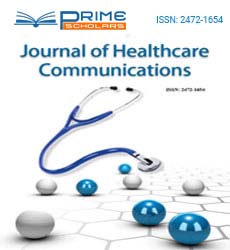Opinion - (2023) Volume 8, Issue 6
Navigating the Maze: Unraveling the Importance of Health Literacy
Linda Turner*
Department of Dermatology, Wake Forest University School of Medicine, USA
*Correspondence:
Linda Turner,
Department of Dermatology, Wake Forest University School of Medicine,
USA,
Email:
Received: 29-Nov-2023, Manuscript No. IPJHCC-24-18793;
Editor assigned: 01-Dec-2023, Pre QC No. IPJHCC-24-18793 (PQ);
Reviewed: 15-Dec-2023, QC No. IPJHCC-24-18793;
Revised: 20-Dec-2023, Manuscript No. IPJHCC-24-18793 (R);
Published:
27-Dec-2023, DOI: 10.36846/2472-1654-8.6.8057
Introduction
In an era dominated by an overflow of health information
from various sources, the concept of health literacy has
become more crucial than ever. Health literacy goes beyond
the ability to read medical instructions; it encompasses a
person’s capacity to comprehend, evaluate, and utilize health
information to make informed decisions about their wellbeing.
As we traverse the intricate landscape of healthcare, it
is imperative to recognize the pivotal role that health literacy
plays in promoting individual and community health.
Description
Health literacy is a dynamic skill set that extends beyond basic
literacy and numeracy. It involves interpreting complex medical
jargon, understanding prescription labels, evaluating healthrelated
information critically, and effectively communicating
with healthcare providers. A population with high health literacy
not only has the ability to access information but also possesses
the skills to apply it in their daily lives, resulting in improved
health outcomes. One of the primary challenges in the realm
of health literacy is the pervasive information asymmetry.
The healthcare industry is often characterized by intricate
terminologies and technical details, making it challenging
for the average person to decipher. This information gap can
lead to misunderstandings, misinformation, and ultimately,
suboptimal health decisions. A person with high health literacy
can navigate through this maze of information, discerning
credible sources from dubious ones, and making choices that
align with their well-being. Addressing health literacy is not
solely the responsibility of individuals; it requires a collective
effort from healthcare providers, policymakers, educators,
and the media. Healthcare providers need to communicate
information in a clear and understandable manner, employing
plain language and visual aids to enhance comprehension.
Policy initiatives should focus on integrating health education
into school curricula and promoting community-based
programs that enhance health literacy. Furthermore, the
media plays a pivotal role in shaping public perceptions of
health. Journalistic practices that prioritize accuracy, simplicity,
and the contextualization of health information can contribute
significantly to improving health literacy. In an age dominated
by digital media, ensuring that online health information
is reliable, accessible, and comprehensible is paramount.
Educational institutions have a crucial role in fostering health
literacy from an early age. By integrating health education
into school curricula, students can develop the skills needed
to critically evaluate health information, understand basic
anatomy and physiology, and navigate the healthcare system
effectively. This not only empowers the younger generation but
also lays the foundation for a society that values and prioritizes
health literacy.
Conclusion
In conclusion, health literacy is the linchpin in our collective
efforts to foster a healthier society. As we navigate the
complex landscape of healthcare information, it is imperative
to recognize the importance of equipping individuals with
the tools they need to make informed decisions about their
health. By addressing health literacy on multiple fronts from
healthcare provider practices to educational initiatives and
media reporting-we can bridge the information gap and
empower individuals to take charge of their well-being. In
doing so, we pave the way for a healthier and more resilient
community that thrives on the principles of informed decisionmaking
and proactive healthcare engagement.
Citation: Turner L (2023) Navigating the Maze: Unraveling the Importance of Health Literacy. J Healthc Commun. 8:8057.
Copyright: © 2023 Turner L. This is an open-access article distributed under the terms of the Creative Commons Attribution License, which permits unrestricted use, distribution, and reproduction in any medium, provided the original author and source are credited.

